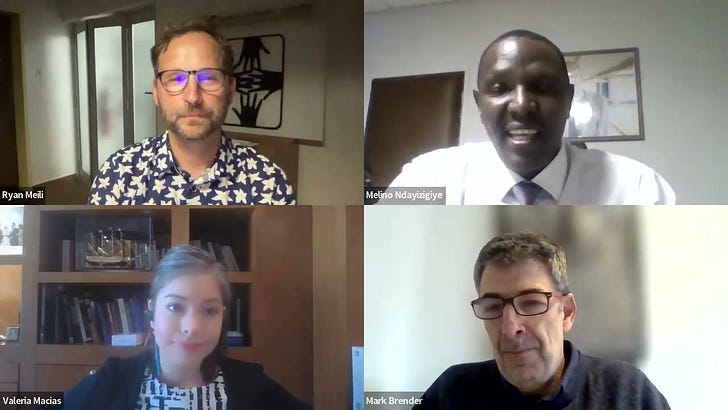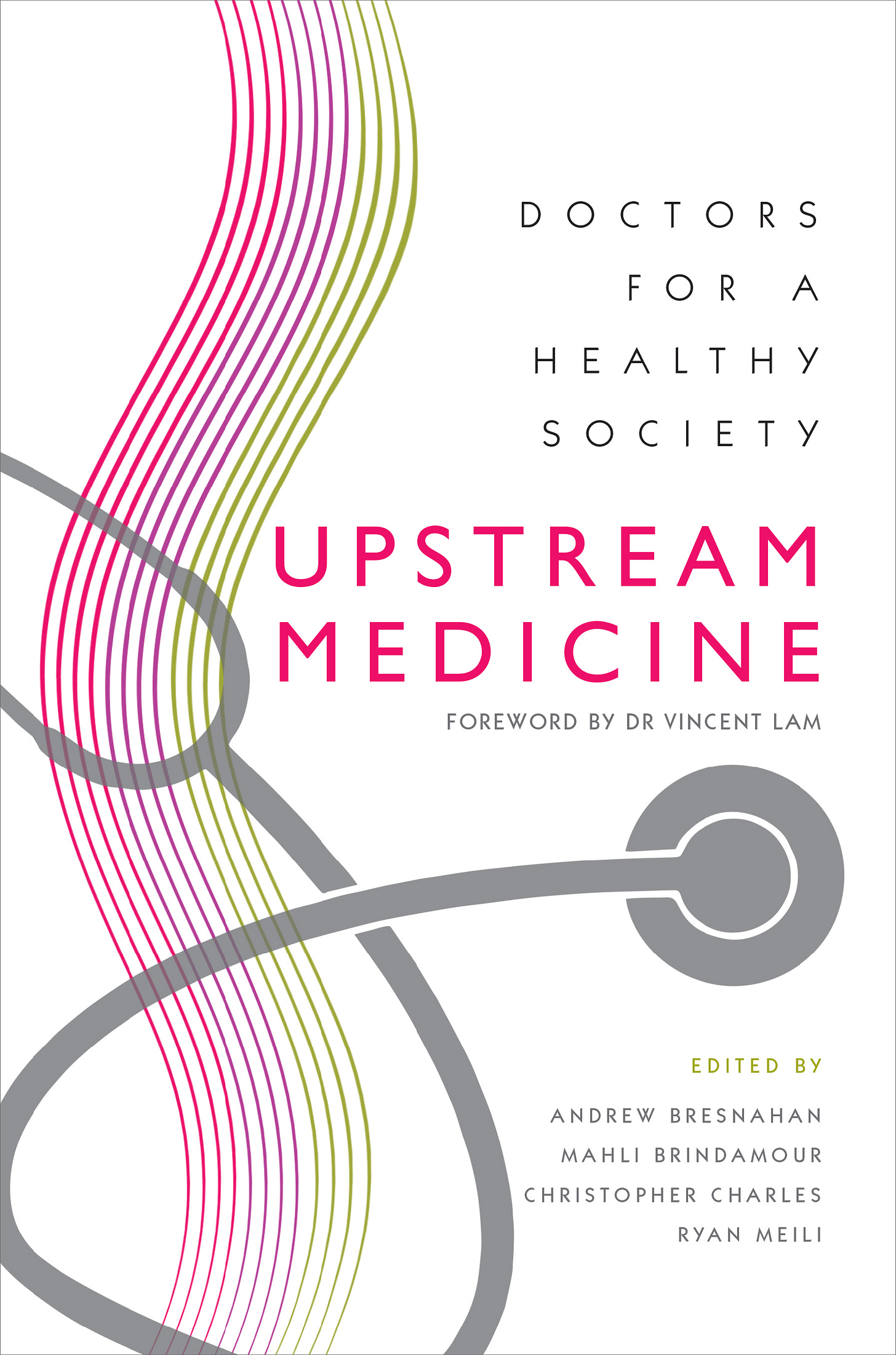Thanks to those who tuned in to Delivering Last Mile Health Care with a Rights-Based Approach, Partners In Health Canada’s webinar with PIH Lesotho Executive Director Dr. Melino Ndayigize, Compañeros en Salud (PIH Mexico) Executive Director Dr. Valeria Macias and PIH Canada National Director Mark Brender.
We had a broad-ranging discussion about the activities of PIH in rural Mexico and Lesotho and why Canadians should care about international development. Most interesting was hearing Drs. Melino and Valeria describe their “bosses”, the patients and community members they serve and how the care and support PIH provides is designed to always make the people we serve the top priority.
Upstream Medicine
Back in 2016, Mahli and I collaborated with two medical learners, Christopher Charles, now an anaesthesiologist and inventor of the Lucky Iron Fish, and Andrew Bresnahan, now a family doctor and wilderness medicine expert in Labrador, on a partnership between the Canadian Federation of Medical Students and Upstream. We were inspired by physicians who were looking beyond the clinical to work for a healthier world. What better way to tell their story than through the eyes of a new generation of medical learners, the very people they were inspiring?.
Medical students and residents from across Canada, all of whom are now practicing doctors and leaders in their own right, interviewed remarkable collection of leaders in medicine and beyond. Danielle Martin, founder of Canadian Doctors for Medicare, Naheed Dosani from PEACH palliative care, Brian Goldman, host of White Coat Black Art, James Orbinski of MSF and Dignitas, Marcia Anderson-DeCoteau of the Indigenous Physicians Association of Canada Courtney Howard of CAPE and many more; the list of luminaries is long and impressive. We even had Jane Philpott, then Canada’s Minister of Health, interviewed by her daughter Bethany, who was a medical student at the time. I marvel that such busy people were willing to share their time and wisdom and admire the commitment to help guide the next generation of colleagues.
The result of these interviews is the book Upstream Medicine: Doctors for A Healthy Society (UBC Press 2016). Reviewing them today, the stories and insights continue to hold lessons for us today as we consider the complex and urgent interactions between politics and health.
In reading this collection of interviews, one cannot help but think that modern medicine has lost its way and that we are now being shown a new path by those that follow. If the future of medicine is in the hands of these distinguished physicians and the remarkable medical students interviewing them, then we have every reason for optimism.
From the Afterword by Dr. Jeff Turnbull
With growing uncertainty in access to care and mounting challenges in making sure people have access to the foundations of good health, it’s timely to revisit this important collection of interviews. If you’re interested in reading them, the publisher is offering readers of A Larger Scale readers a discount on Upstream Medicine until the end of February. Order this month at UBC Press with the discount code UPSTREAM and receive your copy for $10 (regular $29.95).
I’ll leave you today with an excerpt from the book, the foreword by Vincent Lam, emergency medicine and addictions physician and Giller prize winning author of Bloodletting and Miraculous Cures and the 2023 novel On the Ravine.
Foreword - Dr Vincent Lam
As physicians caring for individual patients, we engage fundamentally in an act of imagination. We project our patients’ symptoms, concerns, and predisposing risks into the possibilities that we call a differential diagnosis. Then, as clinicians, we re-cast the scenario before us, wondering how our treatments might divert an otherwise malignant progression of disease. Can we picture that a small antibiotic pill, which carries risks as well as benefits, might potentially alter the course of a potentially fatal pneumonia? Only our speculation of an alternate possible future for the patient in front of us makes any prescription humane and sensible. In treating patients, we must imagine helping them.
To think upstream about health is to broaden the scope of our imagination. It is to consider the roots of violence that led to a traumatic injury. It is to discern whether some gap in our society’s emotional fabric has culminated in an addiction. It is to ask difficult questions: How have conflict and oppression, both within Canada and outside our borders, affected the patients for whom I care? Does an economic system that allows my patient to struggle for basic food and shelter impact their health in a drastic way? How do these forces affect my care of the individual patient? As a physician, what will be my response towards the injustice outside the walls of my clinic?
This is a collection of interviews by medical trainees, who seek to discern both their place in the medical profession and that of the profession within society. They probe the work of practicing physicians who have decided not only to critically survey the world in which their patients live, but also to engage that world as part of their own deeply felt professional visions. Leaders in medicine from Canada’s First Nations, physicians who practice amongst the traumatized and displaced both here and abroad, and physicians who have decided to enter government and politics; they are all upstream thinkers, who hope not only to swim in the river, but to change its flow for the better. Their levers for change come in a variety of shapes, sizes, and colors. The trainees wish to know: how can I help the patient in front of me within his or her reality? And then, can I imagine that this reality could be better?
So they must, as imagining health is nothing less than imagining a better world.
This is a genuinely felt but complex aspiration. The science, the empirical evidence, and the details are important, as is the large vision for a healthier future upon this planet. By identifying biological mechanisms, and harnessing the focused applications of scientific process, stunning biomedical interventions have re-defined our profession over the course of the last century. Meanwhile, we appreciate better than ever the crucial impact of factors as seemingly disparate as water security, political change, and childhood trauma upon community and individual health. Even as we are starting to employ gene therapy for cancers, we are beginning to understand that events external to an individual human being can influence the expression of their genome. The potential scope of an eyes-open, upstream perspective on health is therefore vast. It ranges from the macro to the molecular, from economics to the environment, encompassing politics and ethics. It is so large and interwoven that we are at risk of feeling that we cannot grapple with it effectively. More optimistically, we can hope to use the scope of current knowledge to reflect upon our collective wisdom, or sometimes lack thereof, and act with foresight and wisdom. These interviews concern the expression of this hope, where the personal meets the massive. They are portraits of individual physicians trying to simultaneously cherish the individual patient’s dignity, while advocating for them on the large and sometimes harsh canvas of our unfolding world.
Always, it is about people – their dignity and humanity. The trainee asks: As physicians, what can we do for them? What is our most effective role in their broader life? Where can we push for good? We will always need the experienced, skilled clinician. Let us imagine an ankle expert. We would expect him to be very good at understanding, and mending ankles. How useful if he observes how his patients’ ankles are becoming broken and can find a way for this to occur less often. How profoundly useful if he knows where his patients need to walk.
To think upstream, we must fold into our own lives as doctors a radical type of imagination. This starts by understanding the patient in front of us, then the economic, political, and social forces that impact their health, and then dares to imagine and articulate future laws, systems, and ways of being that express our collective vision for health. As much as these questions provoke and inspire, they challenge us. So they must, as imagining health is nothing less than imagining a better world.





